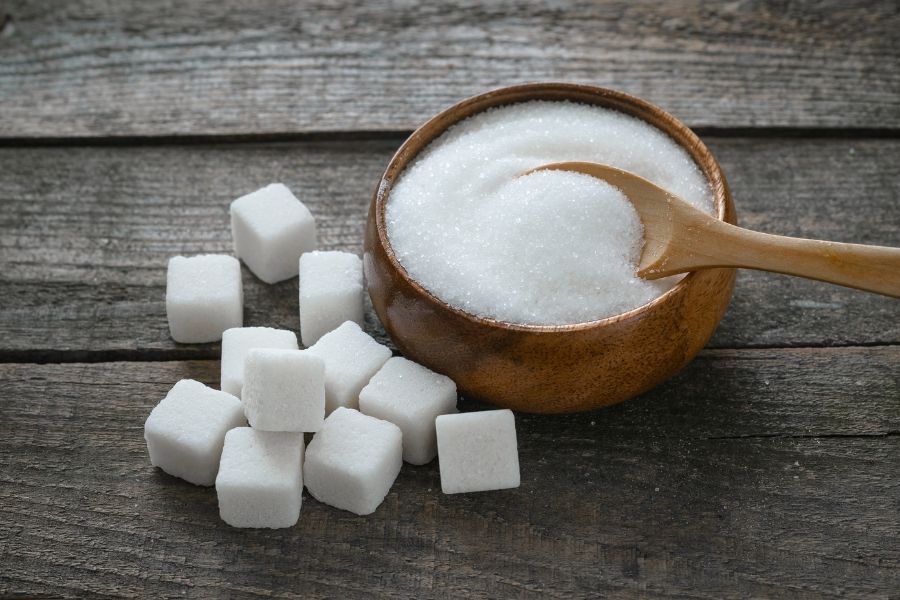
1. What is sugar?
Sugar is a carbohydrate that occurs naturally in many types of food. It can occur naturally in foods such as milk, fruits, honey and certain vegetables. Sugar is also commonly used to improve the taste and flavour of our food. This is known as added sugar.
It is important to have some sugar in our diet to provide our body with a quick supply of energy for our bodily functions.
2. How does sugar affect us?
Sugar by itself provides “empty calories”, which means it provides calories with no nutritional value. One teaspoon of sugar contains about 20 calories, but it does not give us any other nutrients.
- Taking in more calories than what you need in a day will lead to weight gain
- This will increase your chance of being overweight.
- Being overweight may lead to higher chances of developing diabetes, heart diseases, stroke and high blood pressure.
- Taking too much food and drinks high in added sugar can also lead to tooth decay, especially if you do not take proper care of your teeth.
- Germs in the mouth use sugar to produce acid that can damage your teeth.
- Your chance of having tooth decay is higher if you often eat sugary food.
- This is especially true for processed sugar, which can be found in cordials or food containing added sugar.
3. Dietary recommendation
The amount of energy from the added sugar in your diet each day should not exceed 10% of your total calorie intake. This would mean taking 40g–55g (8-11 teaspoons) or less of sugar daily. A 40g sugar limit is based on 1600kcal/day diet, and a 55g sugar limit is based on 2200kcal/day diet.
| Age | Sugar Limit (grams) | Sugar Limit (teaspoons) |
| Less than 1 year | Not more than 25 | 5 |
| 1 - 2 years | Not more than 35 | 7 |
| 3- 6 years | Not more than 45 | 9 |
| 7 - 18 years | Not more than 55 | 11 |
| 18 years and above | Not more than 55 | 11 |
1 level teaspoon = 5g of sugar = 20 calories
The World Health Organization (WHO) further advised that “a reduction to below 5% of total energy intake per day would have additional benefits.”
For adults with a normal body mass index (BMI) who wish to cut down the amount of sugar to just 5% of the total energy intake, they should have less than six teaspoons of sugar daily. This limit includes sugar added to your food and drinks, as well as the sugar in honey, syrups and cakes.
4. What are the different types of sugar?
The following ingredients that you see listed on food labels are actually sugars or contain sugar:
|
|
5. Understanding sugar content in food labels
Examples of the sugar content of the different types of "convenience foods"
 |
| Reading the label: No Sugar Added Apple Juice Each serving contains 26g of sugars which is half of the daily amount of sugars you are allowed to take. |
 |
| Reading the label: Cocoa Malt Drink Each serving contains 16g of sugar which is more than one third of the amount you should take daily. Convenience drinks such as "no sugar added" apple juice are high in sugar content and you should not drink too many packets of them. |
Reading food labels also help us to compare between two similar food items.
- When comparing we will look at the "per 100g" column
- This is because the serving sizes for the two food items are different and therefore cannot be compared directly.
 |
|
Reading the label:
In this packet of "no sugar added" apple juice, apple juice concentrate also contains sugar. For every 100ml of "no sugar added" apple juice, you are taking in 10.4g of sugars. Alternatively, we may consider substitute this with a can of jasmine green tea, in which the sugar intake is lower.

Reading the label:
For every 100ml of jasmine green tea we drink, we are taking in 5.5g of sugars.
Choose drinks with the Healthier Choice Logo "Lower In Sugar".
6. Tips of reducing sugar intake
- Drinking plain water is the best.
- Choose packet drinks with "Lower in Sugar, Healthier Choice" symbol.
- Limit the amount of sugar added to food and drinks.
- Read food labels and compare the sugar content among similar products.
- Use spreads like jam, kaya and marmalade in small amounts.
- Ask for less sugar (siudai) or no sugar (kosong) when ordering coffee and tea.
- Consider using sugar substitutes to add sweetness to your drink. Sugar substitutes are food additives provide sweetness with fewer calories. Examples of sugar substitutes are aspartame, xylitol or saccharin. However, excessive consumption of sweeteners can lead to stomach discomfort such as bloating, and diarrhoea, so do take them in moderation.
- Choose to eat fruits instead of drinking fruit juice. For a healthier blend of fruit juice, add vegetables. For example, celery, carrot and apple juice is two-third vegetable and this contains less sugar than a pure apple juice drink.
 |
|
For more healthier food options, click here.
Updated Oct 2023
.png)



















































